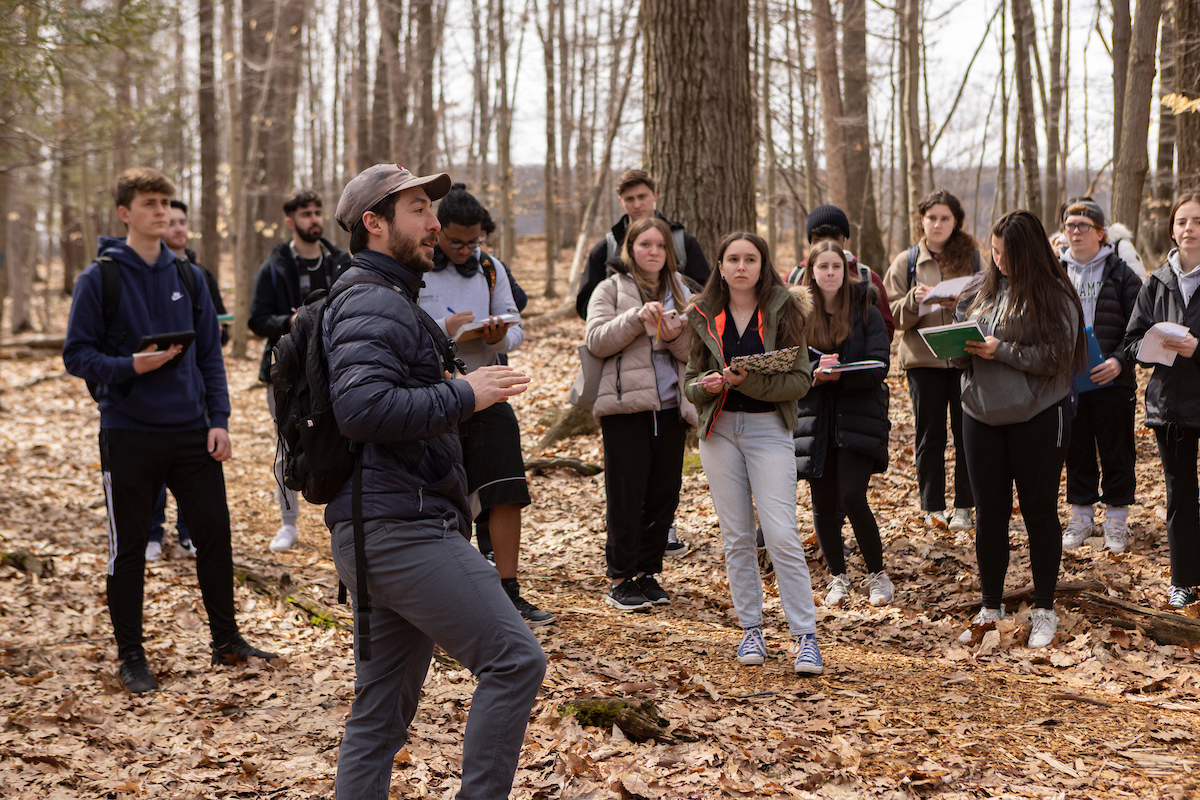The Way of Wonder: Project fosters a holistic view of STEM education
PhD candidate Elias Miller teaches undergrads ‘how to live a meaningful life’

Remember the scene in the original 1971 version of Willy Wonka & the Chocolate Factory when the lucky recipients of the Golden Ticket first entered the factory’s whimsical walls? Wonder spreads across their faces, along with an eagerness to explore.
Elias Miller wants students to feel that way when they arrive on a college campus, sans the shenanigans and the Great Glass Elevator. Enter his dissertation: The Willy Wonka Project, which focuses on how to restore that sense of wonder to undergraduates, particularly in science, technology, engineering and math (STEM).
“When students get here, they should be wide-eyed and excited for the opportunities campus might provide them,” said Miller, a doctoral candidate in biological sciences.
Tellingly, that wasn’t the case for Miller himself when he first arrived at Binghamton University as an undergraduate from Queens, majoring in environmental studies. Like many of his peers, he jumped on the proverbial hamster wheel, focused on the end goal — a degree — rather than exploring the available opportunities.
“We have this idea that this is a steppingstone: You get to college and you get a bachelor’s degree, which can open up the door for you to get the job you want,” he reflected. “What’s missing is this idea of whole person development, apart from developing professionally.”
Holistic development can include emotional intelligence and fostering relationships with others — keys to a meaningful life, wherever a career path may take you. And in fact, “How to Live a Meaningful Life” is the topic of a University 101 course he developed with Associate Professor of Biological Sciences Michelle Withers, his mentor.
“How to Live a Meaningful Life” is taught to first-year students during their first semester on campus. Since the course is an elective, it draws those who are already intrigued by the possibilities of the title and eager to engage with the material.
“Over the course of the semester, we get comments from students like, ‘Oh my gosh, I felt like I can be myself in this class in a way that I don’t get to be in my other classes,’” Miller said. “This is a kind of intimate space where students get to know one another and get to know their instructor.”
Deepening the classroom
As a graduate student, Miller initially found himself working in an animal behavior lab. During his first semester, he took Withers’ course in scholarly teaching, which exposed him to the concept of discipline-based education research.
His dissertation project has three levels: evaluating student expectations for college, weekly 15-minute interventions that give students the opportunity to reflect on the role of college in their life, and finally the University 101 course dedicated to similar interventions intended to deepen their experience.
His project began during a dark time for many students: the coronavirus pandemic, when classes had gone remote and the social opportunities typically enjoyed by college students dissipated. Not unexpectedly, he found that many students during this period began their college experience with feelings of isolation and overall dissatisfaction with their lives. It was a particularly tough time for Asian students, who may have faced discrimination outside the classroom based on stereotypes of COVID-19 as “the Chinese virus.”
With Withers, he measured the impact of different interventions that they implemented in an environmental studies class. The overall idea was to teach students skills that they could use outside the classroom in their lives and communities, he said. To that end, they developed learning modules focused on ecological concepts connected to food production and waste.
Put into practice, the instructor might lead a classroom discussion on food waste, ask students for ideas on how to address the issue and then give them opportunity to enact real change by volunteering with organizations off campus. It’s a hands-on kind of learning that doesn’t focus on memorization or test scores.
Miller found that his own educational experiences were deepened by activism, starting in his undergraduate days; he works with Binghamton Food Rescue, which redistributes food waste from farmers’ markets to communities that lack access to fresh produce. A self-identified foodie, the mission also aligns with his focus on the environment.
“Globally, over a third of food is wasted and the numbers are even higher in the United States,” he said. “I think that’s a travesty.”
Outside of STEM, Miller also teaches a hiking class through Outdoor Pursuits. Now that he’s completing his doctorate, he has turned his eye to the future: He’s open to a range of professional possibilities, teaching, educational technology and sustainable development among them.
“It’s been a privilege and a pleasure to work with Elias. He’s a genuinely kind, compassionate person who sees problems in the world and wants to fix them,” Withers said. “His zeal for activism contributed to the development of a unique dissertation project focused on making higher education, particularly STEM, more transformational and nurturing of students’ development as humans who will contribute to an equitable, sustainable society.”
